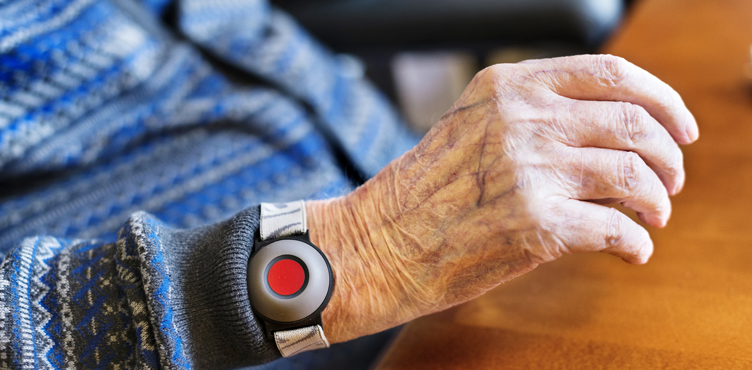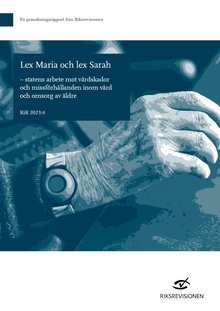Work on mandatory reporting needs to be more effective
Central government efforts to prevent healthcare-related injuries and mistreatment in health and social care of the elderly is not sufficiently effective. The Swedish National Audit Office recommends that support, supervision and follow-up be strengthened. Furthermore, the right of those affected and their close relatives to be heard should be strengthened.

Photo: Scandinav
Healthcare-related injuries and mistreatment such as neglect, abuse and other causes of harm lead to suffering for individuals and major costs for society. The Swedish National Audit Office has audited central government efforts to prevent healthcare-related injuries mistreatment in health and social care in line with the provisions on mandatory reporting (known as lex Maria and lex Sarah). The overall conclusion is that the central government efforts are not effective.
The responsibility for preventing healthcare-related injuries and mistreatment via the provisions on lex Sarah and lex Maria lies with the health and social care providers. The audit shows that many healthcare-related injuries and mistreatment remain undetected, and that investigations do not always lead to improvements. This, in turn, means that serious incidents are not reported to the Health and Care Inspectorate (IVO), which then finds it more difficult to focus their supervision on the largest problems.
Central government is to contribute to the achievement of the goals in the provisions. However, the Swedish National Audit Office notes that the supervision carried out by IVO based on lex Maria and lex Sarah provisions has some shortcomings. IVO closes cases, despite the fact that the providers have not thoroughly investigated the incident and without proposing measures that get to the bottom of the root causes.
The audit also shows that central government control for greater patient safety has created significant potential for efforts to prevent healthcare-related injuries. However, work on patient safety has not progressed as far in municipal health and social care, which includes care of the elderly. In their efforts on patient safety, the Government and the National Board of Health and Welfare need to give priority to municipal care. There is no central government control to reduce the number of mistreatment in social care of the elderly, and that control should be strengthened.
“The central government agencies are expected to contribute to legislative compliance. If those efforts are not effective, there is an increased risk that shortcomings in care of the elderly are not remedied, and that healthcare-related injuries and mistreatment occur again,” says Olof Widmark, project leader for the audit.
Healthcare-related injuries and mistreatment can often be traumatic for the person affected as well as for their close relatives. It is important that health and social care providers take the individual’s perspective as their starting point, and not just as information when developing their activities. It is not currently mandatory to inform those affected and their close relatives in the event of mistreatment. It is also not mandatory to listen to those affected and their close relatives when healthcare-related injuries or mistreatment occur. In the opinion of the Swedish National Audit Office, the position of the individual therefore needs to be strengthened.
“The Government should strengthen national control, for example by producing a national action plan to increase the quality of care, and to give priority to municipal health and social care in the efforts to prevent healthcare-related injuries. In addition, the patient and user perspectives need to be strengthened in the legislation,” says Auditor General Helena Lindberg.
Recommendations in brief
The recommendations to the Government include strengthening national control of quality in the care of the elderly, with the aim of reducing the number of incidents of mistreatment and, in the provisions on mandatory reporting, strengthening the right of the individual to be heard.
IVO is recommended to strengthen the quality and equivalence in the processing of lex Maria and lex Sarah cases.
The National Board of Health and Welfare is recommended to, among others, develop follow-up of healthcare-related injuries in health and social care of the elderly, and to identify the occurrence of mistreatment.
See the report for the recommendations in full.
Lex Maria and lex Sarah provisions in health and social care of the elderly
Under the provisions on mandatory reporting (known as lex Maria and lex Sarah), providers of health and social care must detect, investigate and prevent incidents that have, or could have resulted in a healthcare-related injury or mistreatment. The aim is to prevent similar incidents from happening again. In health and social care of the elderly, common healthcare-related injuries include pharmaceutical-related injuries, fall injuries, bedsores, healthcare-related infections and undernourishment. Mistreatment include physical, mental or financial abuse, shortcomings in response such as lack of respect, autonomy, privacy or security. It can also refer to shortcomings in the performance of an action, the fact that an approved action is not carried out or shortcomings in case processing.
Press contact: Olle Castelius, phone: +46 8-5171 40 04.
Presskontakt: Olle Castelius , telefon: 08-5171 42 06.
Share in social media and by e-mail
Contact form
Send your questions or comments via the form below and we will make sure that they reach the right member of staff. Please state if your question concerns the information on this particular page.


